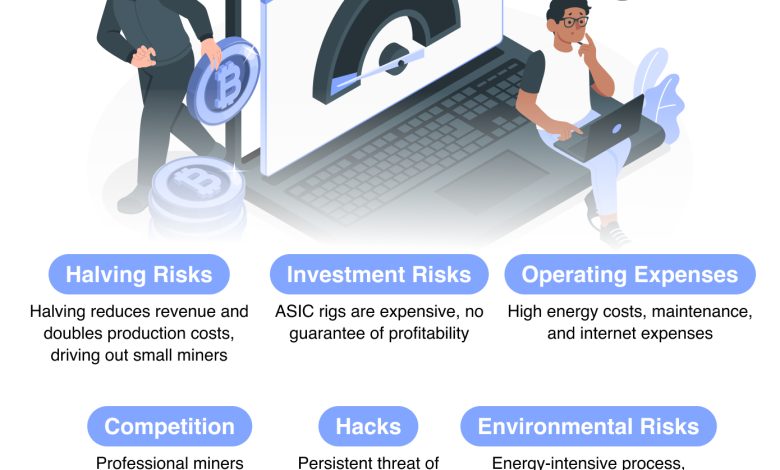Risks Involved in Cryptocurrency Mining

- Understanding the Environmental Impact of Cryptocurrency Mining
- Exploring the Volatility of Cryptocurrency Prices
- The Security Risks Associated with Cryptocurrency Mining
- Regulatory Challenges Faced by Cryptocurrency Miners
- Health Risks for Miners: Physical and Mental Well-being
- The Energy Consumption Debate: Is Cryptocurrency Mining Sustainable?
Understanding the Environmental Impact of Cryptocurrency Mining
Understanding the environmental impact of cryptocurrency mining is crucial in assessing the risks involved in this process. Cryptocurrency mining consumes a significant amount of energy, leading to a high carbon footprint. The process involves solving complex mathematical problems to validate transactions on the blockchain, which requires powerful computers that consume a large amount of electricity. This energy-intensive process contributes to the depletion of natural resources and increases greenhouse gas emissions, exacerbating climate change.
Exploring the Volatility of Cryptocurrency Prices
One of the major risks associated with cryptocurrency mining is the volatility of cryptocurrency prices. The value of cryptocurrencies such as Bitcoin, Ethereum, and Litecoin can fluctuate dramatically in a short period of time. This volatility can have a significant impact on the profitability of mining operations.
When the price of a cryptocurrency drops, miners may find that the cost of electricity and hardware maintenance exceeds the value of the coins they are able to mine. This can lead to miners operating at a loss or even shutting down their operations altogether. On the other hand, when the price of a cryptocurrency rises, miners may see a surge in profits. However, this increase in profitability is not guaranteed and can be short-lived.
It is important for miners to carefully monitor cryptocurrency prices and market trends to make informed decisions about when to mine and when to sell their coins. Diversifying mining operations across multiple cryptocurrencies can also help mitigate the risks associated with price volatility. Additionally, setting up stop-loss orders and implementing risk management strategies can help protect miners from significant financial losses.
The Security Risks Associated with Cryptocurrency Mining
Cryptocurrency mining poses several security risks that individuals and organizations should be aware of. One of the main risks is the potential for cyber attacks. Hackers may target mining operations to steal valuable cryptocurrencies or sensitive information. This can result in financial losses and reputational damage.
Another security risk associated with cryptocurrency mining is the possibility of malware infections. Malicious software can be used to infect mining rigs and steal computing power, compromising the integrity of the mining process. This can lead to reduced mining efficiency and profitability.
Additionally, cryptocurrency mining can also expose individuals and organizations to regulatory risks. Depending on the jurisdiction, mining activities may be subject to legal restrictions and requirements. Failure to comply with these regulations can result in fines, penalties, or even legal action.
Furthermore, the decentralized nature of cryptocurrencies can make it challenging to recover lost or stolen funds. Unlike traditional financial systems, there is no central authority to turn to for help in the event of a security breach. This lack of recourse can leave miners vulnerable to significant financial losses.
Regulatory Challenges Faced by Cryptocurrency Miners
One of the significant challenges that cryptocurrency miners face is navigating the complex regulatory landscape. Governments around the world are still grappling with how to regulate cryptocurrencies, leading to uncertainty for miners. **Regulatory** bodies may impose restrictions or **requirements** on mining operations, which can vary widely from country to country. This lack of **clarity** can make it difficult for miners to ensure they are in compliance with the law.
In some cases, **regulators** may view cryptocurrency mining as a threat to traditional financial systems and seek to impose strict regulations or even ban mining altogether. This can create a hostile environment for miners, forcing them to operate underground or in jurisdictions with more favorable **regulations**. Additionally, **regulatory** changes can happen suddenly, catching miners off guard and potentially putting their operations at risk.
Another challenge faced by cryptocurrency miners is the **uncertainty** surrounding tax **obligations**. Different countries have different **tax** laws when it comes to cryptocurrencies, and miners may struggle to understand their **tax** liabilities. Failure to comply with **tax** laws can result in hefty fines or even legal action, adding another layer of **risk** to an already volatile industry.
Overall, navigating the **regulatory** challenges of cryptocurrency mining requires miners to stay informed about **regulatory** developments in their jurisdiction and adapt quickly to changes. By staying **compliant** with **regulations** and **tax** laws, miners can mitigate some of the **risks** associated with their operations and ensure the long-term **sustainability** of their mining activities.
Health Risks for Miners: Physical and Mental Well-being
Mining for cryptocurrency can pose significant health risks to miners, both physically and mentally. It is important for individuals involved in this industry to be aware of these potential dangers in order to protect their well-being.
Physical health risks for miners include prolonged sitting or standing in front of computer screens, which can lead to issues such as eye strain, back pain, and poor posture. Additionally, the repetitive motions involved in mining can result in musculoskeletal problems over time.
Mentally, miners may experience high levels of stress and anxiety due to the volatile nature of the cryptocurrency market. The pressure to constantly monitor prices and make quick decisions can take a toll on mental well-being.
It is crucial for miners to prioritize their health and take steps to mitigate these risks. This can include taking regular breaks to stretch and move around, practicing good posture, and implementing stress-reducing techniques such as mindfulness or meditation.
The Energy Consumption Debate: Is Cryptocurrency Mining Sustainable?
One of the most debated topics in the realm of cryptocurrency mining is the energy consumption associated with the process. Critics argue that the energy-intensive nature of mining operations is unsustainable and detrimental to the environment. On the other hand, proponents of cryptocurrency mining claim that the use of renewable energy sources can mitigate the environmental impact.
It is essential to consider the energy consumption debate when evaluating the risks involved in cryptocurrency mining. The process of mining requires a significant amount of computational power, which translates to high energy consumption. This has raised concerns about the carbon footprint of mining operations and their long-term sustainability.
While some mining operations have started to transition to renewable energy sources such as solar or wind power, the majority still rely on traditional energy sources. This reliance on non-renewable energy contributes to the overall carbon emissions associated with cryptocurrency mining.
As the popularity of cryptocurrencies continues to grow, so does the energy consumption of mining operations. This trend has sparked a global conversation about the sustainability of cryptocurrency mining and the need for innovative solutions to reduce its environmental impact.





